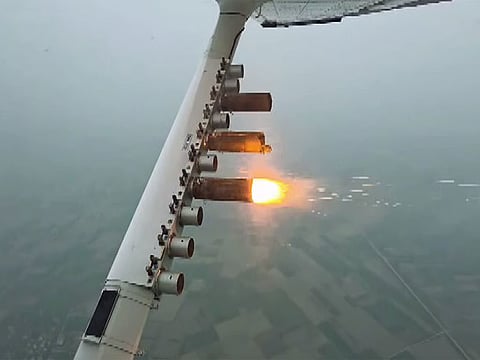

LUCKNOW: IIT Kanpur director Manindra Agrawal said that while the recent cloud seeding exercise in Delhi failed to induce artificial rain, it provided valuable information for future endeavours, particularly in understanding pollution reduction dynamics, reports Namita Bajpai of The New Indian Express.
Interacting with media persons on Wednesday, the IIT director said that data gathered from 15 monitoring stations set up across the national capital to measure air pollution and moisture levels showed a 6–10 per cent reduction in PM 2.5 and PM 10 concentration.
On Tuesday, two aircraft had taken off from airfields in Kanpur and Meerut managed by the IIT Kanpur expert team. The operation covered Khekra, Burari, North Karol Bagh, Mayur Vihar, Sadakpur, Bhojpur, and surrounding regions. Each flare weighed about 0.5 kg, with eight flares released per sortie, dispersing a tested mixture designed to enhance precipitation potential.
Talking about the trial being unsuccessful and the high expenditure associated with cloud seeding, he reiterated that the term “experiment” implied the possibility of both success and failure. “If we fear failure and don't undertake an experiment, then we will not make progress,” he added.
“This shows that even with a very small or low level of moisture in the cloud, when we do the seeding, it does result in some impact, not the impact that one would ideally like to see, but still some impact,” said the IIT-K professor, adding that it was extremely useful information for future endeavours.
He said that the cloud moisture was very low at around 15 per cent. “Due to the low moisture content, the chances of inducing rain were very small, so we did not achieve success in that regard,” he explained.
Prof Agrawal further stated that the overall cost of cloud seeding was not as high as the amount being spent to control pollution in Delhi. He said that seeding an area of about 300 sq km was estimated to cost somewhere around Rs 60 lakh, which comes to approximately Rs 20,000 per sq km. “If the process is done for the entire winter month, around Rs 25–30 crore will be spent. The amount of money spent on pollution control in Delhi is much more,” he added.
Meanwhile, the cloud-seeding activity planned for 29 October 2025 has reportedly been put on hold due to insufficient moisture in the clouds, as the process is highly dependent on the right atmospheric conditions.
